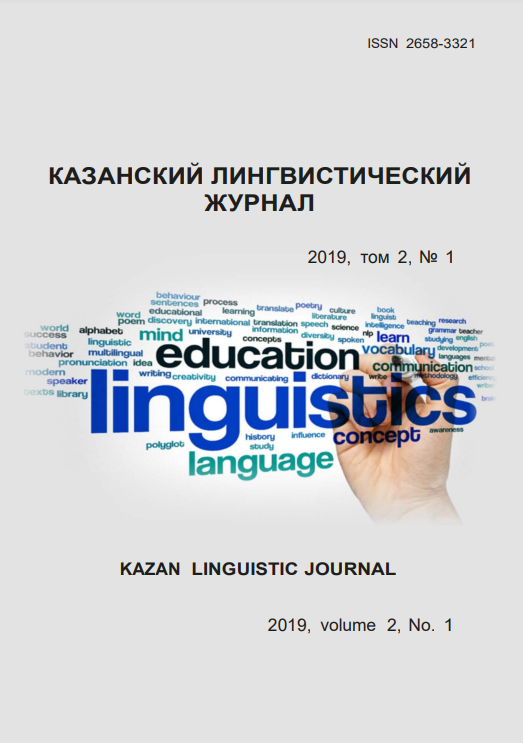Lexical-semantic aspect of the concept “fear” (on the material of the English and Tatar phraseological units with the component-zoonim)
Keywords:
English, Tatar, concept, phraseological unit, zoonimAbstract
The gravity of the problem under study is specified by the fact that the research of concepts through their linguistic explicates is currently one of the issues of the modern cognitive linguistics, which in turn, helps to reveal the very structure of the concept. A comparison of the equivalent concepts in the English and Tatar language pictures of the world enables disclosing their cultural identity. The aim of the article is to discover the lexical-semantic features of the concept “fear” as well as identify the universal and national characteristics in representation of the analyzed concept through phraseological means of the English and Tatar languages. The science-based approach will dominate in the process of this problem investigation. Descriptive- analytical and comparative scientific methods of research are used. The methods of component, contextual and statistical analysis are employed. The authors also partially use the method of idiomatic modeling. As a rule, certain characteristics and features of people are transferred through a definite image of an animal. The names of the animals within the phraseological units are mainly used in figurative sense. About 5 animal names have been involved in the Tatar and English phraseological units. We have revealed universal and national features in the analyzed concepts and their representations by phraseological means of the English and Tatar languages.
References
Литература
Гимадеева А.А. Фразеологические единицы с компонентом-зоонимом в татарском и английском языках и их лексикографирование: дисс. … канд. филол. наук. Казань, 2011. 243 c.
Замалетдинов Р.Р. Татарская культура в языковом отражении. Казань: Магариф, 2004. 239 с.
Каримова Р.Х. Концепт «труд» в паремиологии неродственных языков: дисс. … канд.филол. наук. Уфа, 2004. 199 с.
Ковалева Л.В. Фразеологизация как когнитивный процесс. Воронеж, Изд-во Воронеж. гос. Ун-та, 2004. 184 с.
Мансурова Г.И. Когнитивный аспект перевода фразеологических единиц: на материале художественных произведений английских и американских авторов: дисс. … канд. филол. наук. Уфа, 2006. 164 с.
Сафина З.М. Когнитивно-лексикографическое описание фразеологических единиц со структурно-семантическим компонентом цвета (на материале английского, башкирского и русского языков): дисс. … канд. филол. наук. Уфа, 2004. 213 с.
Скитина Н.А. Лингвокогнитивный анализ фразеологических единиц с зоонимным компонентом (на материале русского, английского и немецкого языков): дисс. … канд. филол. наук. Москва, 2007. 227 с.
[ТСТЯ] Татар теленең аңлатмалы сүзлеге, Т.2. (К-С). Казан: Тат. кит. нәшр., 1979. 726 б.
[OALD] Hornby A.S., Oxford Advanced Learner’s Dictionary. Oxford University Press, 1995. 1428 p.
References
Gimadeeva, А.А. (2011). Frazeologicheskie edinitsy s komponentom- zoonimom v tatarskom i anglijskom yazykakh i ik hleksikografirovanie: diss. … kand. filol. nauk [Phraseological units with a component-zoonim in the Tatar and English languages and their lexicography: Candidate’s Thesis]. Kazan'. 243 p. (in Russian)
Zamaletdinov, R.R. (2004). Tatarskaya kul'tura v yazykovom otrazhenii
[The Tatar culture in language reflection]. Kazan': Magarif. 239p. (In Russian)
Karimova, R. KH. (2004). Kontsept «trud» v paremiologii nerodstvennykh yazykov: diss. … kand. filol. nauk. [Concept "work" in paremiology of unrelated languages: Candidate’s Thesis]. Ufa. 199 p. (In Russian)
Kovaleva, L.V. (2004). Frazeologizatsiya kak kognitivnyj protsess
[Frazeologization as cognitive process]. Voronezh: Izd-voVoronezh. gos. Un-ta. 184
p. (In Russian)
Mansurova, G.I. (2006). Kognitivnyj aspect perevoda frazeologicheskik hedinits: na materiale khudozhestvennykh proizvedenij anglijskikh I amerikanskikh avtorov: diss. … kand. filol. nauk. [Cognitive aspect of the translation of phraseological units: on basis of fiction of the English and American authors: Candidate’s Thesis]. Ufa. 164 p. (In Russian)
Safina, Z.M. (2004). Kognitivno-leksikograficheskoe opisanie frazeologicheskikh edinits so strukturno-semanticheskim komponentom tsveta (na material anglijskogo, bashkirskogo I russkogo yazykov): diss. … kand. filol. nauk [The cognitive and lexicographic description of phraseological units with a structural- semantic component of color (on material of the English, Bashkir and Russian languages): Candidate’s Thesis]. Ufa. 213 p. (In Russian)
Skitina, N.А. (2007). Lingvokognitivnyj analiz frazeologicheskikh edinits s zoonimnym komponentom (na material russkogo, anglijskogo i nemetskogo yazykov): diss. … kand. filol. nauk [The linguo-cognitive analysis of phraseological units with a component-zoonim (on material of the Russian, English and German languages): Candidate’s Thesis]. Moskva. 227 p. (In Russian)
Tatar teleneң aңlatmaly sүzlege (1979). [Explanatory dictionary of the Tatar language]. T.2. (K-S). Kazan: Tat. kit. nәshr. 726 p. (in Tatar)
Hornby, A.S. (1995). Oxford Advanced Learner’s Dictionary. Oxford University Press. 425 p. (In English)






